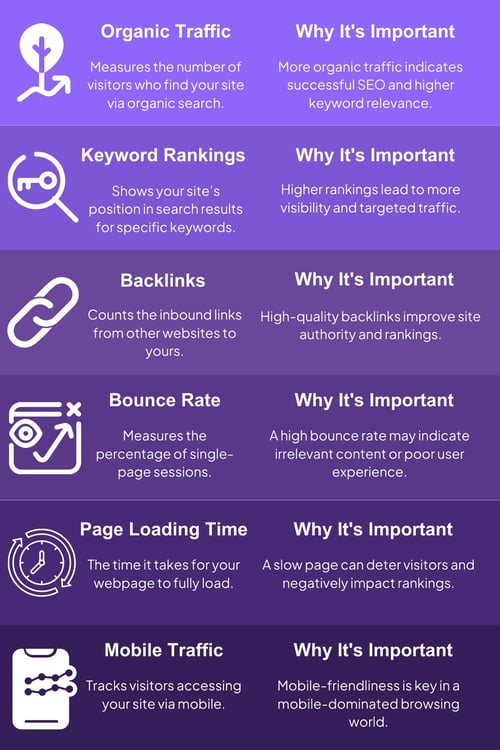Unlock the secrets of SEO KPIs and take your website to new heights with these essential tips and tricks.

Image courtesy of via DALL-E 3
Table of Contents
Introduction to SEO KPIs
Search Engine Optimization, or SEO, is like a secret code that helps websites perform better and stand out in the vast online world. But how can websites measure, monitor, and maximize their success in the digital realm? That’s where SEO KPIs come into play!
What are SEO KPIs?
SEO KPIs may sound like a mouthful of big words, but they are actually quite simple when broken down. Imagine SEO KPIs as special measuring tools that help website owners keep track of how well their website is doing in terms of attracting visitors, keeping them engaged, and appearing in search results. These tools, or Key Performance Indicators (KPIs), are like a website’s report card, showing areas of strength and areas that need improvement.
Why are SEO KPIs Important?
SEO KPIs play a vital role in the success of a website. Just like how a compass guides a traveler through uncharted territories, SEO KPIs guide website owners in understanding what is working well and what needs attention. By measuring and monitoring these KPIs, website owners can make informed decisions to improve their website’s performance and reach more people searching for what they have to offer.
Choosing the Right SEO KPIs
Before you can choose the right Key Performance Indicators (KPIs) for your website, it’s essential to understand your goals. Think about what you want to achieve with your site. Are you looking to increase website traffic, improve user engagement, or boost sales? Setting clear goals will help you identify which KPIs are most relevant to measure your success.
Relevance to Your Website
Not all KPIs are created equal, and what works for one website may not be as relevant for another. Consider the nature of your website and your specific objectives. For example, an e-commerce site may prioritize metrics like conversion rate and average order value, while a blog might focus more on page views and time on site. Choose KPIs that align with your website’s goals and target audience to ensure they are meaningful and actionable.
Essential SEO KPIs
In the world of websites and online content, there are key metrics that help measure the success and effectiveness of search engine optimization (SEO) efforts. These metrics are known as Key Performance Indicators (KPIs). By tracking these essential SEO KPIs, website owners and digital marketers can gain valuable insights into how well their site is performing and make informed decisions to improve its visibility and reach.

Image courtesy of www.forecom-solutions.com via Google Images
Traffic Volume
Traffic volume is a critical SEO KPI that measures the number of visitors coming to a website. The more visitors a site receives, the greater its potential for success. Monitoring traffic volume helps website owners understand how well their content is resonating with their target audience and whether their SEO strategies are driving the desired traffic.
Bounce Rate
Another important SEO KPI is the bounce rate. This metric indicates the percentage of visitors who leave a website after viewing only one page. A high bounce rate could signal that the content or user experience on the site needs improvement. By reducing the bounce rate, website owners can keep visitors engaged and increase the chances of conversion.
Keyword Rankings
Tracking keyword rankings is essential for SEO success. Keywords are the terms and phrases people use to search for information online, and ranking well for relevant keywords can significantly impact a website’s visibility in search engine results. Monitoring keyword rankings helps website owners identify which terms are driving traffic and where there is room for improvement to boost rankings further.
Tools for Measuring SEO KPIs
When it comes to measuring SEO KPIs, there are several tools available that can help you track and analyze your website’s performance. Let’s take a look at some of the most popular tools that can assist you in monitoring your SEO metrics effectively.
Google Analytics
Google Analytics is a powerful tool that provides valuable insights into your website’s traffic and user behavior. With Google Analytics, you can track key SEO metrics such as organic traffic, referral sources, and user engagement. By analyzing this data, you can gain a better understanding of how your website is performing and identify areas for improvement.
SEMrush
SEMrush is another essential tool for measuring SEO KPIs. It offers a comprehensive suite of features that can help you track keyword rankings, analyze backlinks, and conduct competitor research. SEMrush provides valuable data that can help you optimize your website for better search engine visibility and performance.
Ahrefs
Ahrefs is a popular tool among SEO professionals for monitoring SEO KPIs. It offers a range of features such as keyword research, backlink analysis, and site audits. With Ahrefs, you can track your website’s performance, identify opportunities for improvement, and stay ahead of your competitors in the search results.
How to Monitor Your SEO KPIs
When it comes to ensuring the success of your website, consistently monitoring your SEO KPIs is essential. By keeping a close eye on these key metrics, you can track your progress and make informed decisions to improve your site’s performance. Here’s how you can effectively monitor your SEO KPIs to ensure you are on the right track:

Image courtesy of www.gravitatedesign.com via Google Images
Regular Check-ins
It’s important to schedule regular check-ins to review your SEO KPIs. This could be on a weekly, bi-weekly, or monthly basis, depending on your website’s needs and goals. By consistently monitoring your KPIs, you can identify trends, spot issues early on, and make timely adjustments to your SEO strategy.
Setting Benchmarks
Setting benchmarks for your SEO KPIs is crucial for measuring success and progress. By establishing clear goals for each metric, you can track your performance over time and determine whether you are on the right path. Benchmarks also provide a point of reference for evaluating the effectiveness of your SEO efforts and making necessary adjustments.
Interpreting SEO KPI Data
When looking at the data gathered from your SEO KPIs, it’s essential to pay attention to trends. Trends show patterns or changes over time, such as increases or decreases in website traffic, bounce rates, or keyword rankings. By understanding these trends, you can identify what strategies are working well and which ones may need adjustment.
Making Data-Driven Decisions
Interpreting SEO KPI data allows you to make informed decisions about your website. For example, if you notice a particular keyword is driving a significant amount of traffic to your site, you may choose to create more content around that keyword to capitalize on its success. On the other hand, if you see a high bounce rate on a specific page, you can investigate why visitors are leaving and make improvements to increase user engagement and retention.
Maximizing Your SEO Success
In order to achieve the best results for your website, it’s important to maximize your SEO success based on the insights gathered from your Key Performance Indicators (KPIs). By implementing the right strategies, you can improve your website’s performance and attract more visitors.

Image courtesy of www.growtraffic.co.uk via Google Images
Optimizing Content
One way to enhance your SEO success is by optimizing your content based on the data provided by your KPIs. Pay attention to the keywords that are driving traffic to your site and create high-quality, relevant content around those keywords. By focusing on creating valuable content that resonates with your audience, you can improve your search engine rankings and attract more visitors to your site.
Improving User Experience
Another crucial aspect of maximizing your SEO success is by enhancing the user experience on your website. Make sure your site is easy to navigate, loads quickly, and provides valuable information to visitors. By improving the user experience, you can decrease your bounce rate and increase user engagement, leading to better KPI scores and improved search engine rankings.
Common Pitfalls and How to Avoid Them
One common pitfall in dealing with SEO KPIs is ignoring the data that is collected. When you don’t pay attention to the metrics and insights provided by your KPIs, you miss out on valuable information that could help improve your website’s performance. It’s important to regularly review and analyze the data to identify areas for growth and optimization.
Overlooking User Intent
Another mistake to avoid is overlooking user intent when optimizing your website based on SEO KPIs. User intent refers to what the user is looking for when they search online. By understanding and catering to user intent, you can create content that is more relevant and valuable to your audience. Failing to consider user intent can result in lower engagement and conversion rates, impacting the success of your SEO efforts.
Frequently Asked Questions (FAQs)
It’s common to encounter a situation where your SEO KPIs may not be showing the desired improvement. When this happens, it’s essential to take a step back and evaluate what could be causing the lack of progress. Consider revisiting your strategies, analyzing your content quality and relevance, or even reassessing your target audience. Sometimes, a simple adjustment in your approach can make a significant difference. Remember, continuous monitoring and willingness to adapt are key to improving your KPIs over time.

Image courtesy of leadadvisors.com via Google Images
How often should I check my KPIs?
Checking your SEO KPIs regularly is crucial to stay on top of your website’s performance. Ideally, it would be best to monitor your KPIs at least once a week to ensure you catch any trends or issues promptly. However, the frequency of checking can vary depending on the specific goals and targets you have set for your website. If you are in a period of intense optimization or marketing campaigns, you may want to check your KPIs more frequently to track progress and make adjustments as needed. Consistent monitoring allows you to be proactive and responsive to changes in your website’s performance.
Remember, successful SEO is a continuous process that involves monitoring, analyzing, and refining your strategies based on the insights gained from your KPIs. Stay patient and persistent, and you’ll see improvements in your website’s performance over time.
Conclusion
In this article, we’ve delved into the world of SEO KPIs, exploring how these metrics play a crucial role in measuring, monitoring, and maximizing the success of websites. Let’s recap the key points covered and why it’s essential to keep a close eye on your SEO performance.
Recap of Key Points
We began by defining what SEO KPIs are and why they are important for understanding website performance. By choosing the right SEO KPIs that align with your goals and website relevance, you can track essential metrics like traffic volume, bounce rate, and keyword rankings to gauge success effectively.
Throughout the article, we highlighted the importance of using tools like Google Analytics, SEMrush, and Ahrefs to measure and monitor SEO KPIs accurately. By regularly checking in on your KPIs and setting benchmarks for success, you can make data-driven decisions to improve your website’s performance.
Encouragement for Ongoing Monitoring
As you continue your journey in the world of SEO, remember that monitoring your KPIs is an ongoing process. By interpreting the data collected and making necessary improvements to your content and user experience, you can maximize your SEO success and avoid common pitfalls.
Don’t forget that SEO is a dynamic field, and staying vigilant in monitoring your KPIs will help you stay ahead of the curve. Keep striving for improvement, and with dedication and the right strategies, you can achieve your website’s full potential.







